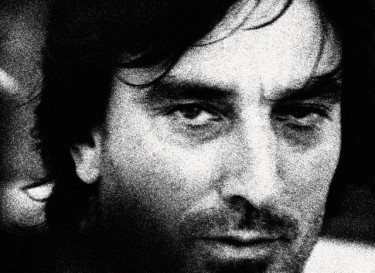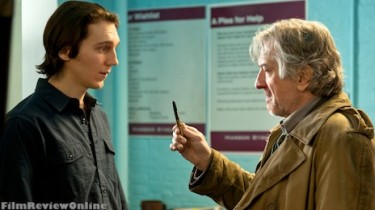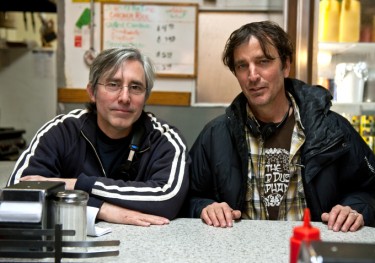 Back to selection
Back to selection
An Interview with Nick Flynn About Being Flynn
As a child growing up in Scituate, Massachusetts, Nick Flynn (pictured here at left and below with director Paul Weitz) was often left to explore on his own, and he got into varying degrees of trouble. Flynn’s parents were divorced and he had no contact with his father, living instead with his mother, who worked in a bakery. She remarried to a 21-year-old Viet Nam vet, and, after their divorce, Flynn wound up living with her and a new boyfriend — a member of one of the largest drug smuggling rings in New England. Around the age of 18 Flynn started working for the smuggler — unloading fishing boats and as an electrician’s apprentice – and he’d get high every day to make the work bearable. Eventually the boyfriend got busted and Flynn had to show up in court to speak to his character.

Just a couple of years earlier, Flynn’s own estranged father wound up in prison. The elder Flynn began to write his son, sending him hundreds of letters. But it would be almost a decade before they’d unexpectedly meet face to face at a homeless shelter, where Flynn was a social worker and his father, Jonathan, was seeking a room. This meeting and their subsequent relationship led Flynn to write his memoir, Another Bullshit Night In Suck City, which was how his father often described the experience of being homeless in Boston.
The book (published by Norton in 2004) won the PEN/Martha Albrand award, has been translated into over ten languages, and is now a feature film, Being Flynn, written and directed by Paul Weitz (About A Boy). (“Bullshit” in the title apparently doesn’t fly with American moviegoers.) Robert De Niro plays Jonathan, Julianne Moore is Flynn’s mother, and Paul Dano is the author as a young man. Flynn’s real-life wife, Lili Taylor, also appears in the film.
I spoke with Flynn this past Winter, as the film was finishing its post-production. Being Flynn opens today from Focus Features.
FILMMAKER: You wrote a book about the experience of making Being Flynn.
FLYNN: It’s a draft. It’s called The Glass Flowers. Do you know about the glass flowers? It’s an exhibit at Harvard that’s been there for over 100 years. It’s a collection of these manufactured or fabricated glass flowers. It’s part of the Harvard Museum of Natural History. I used to go there with my mother. Mostly I remember it for the stuffed animals. I was really into the stuffed gorilla. And in this one room were the glass flowers.These perfect replicas were made by this German father-son team over the course of many years; they made exact botanical models of all the flowers in the world. The book is a meditation on these glass flowers, and on the idea of recreating reality. Representation. Their shelf life in the museum is theoretically forever, but now the glass is starting to break down, which is really interesting. They don’t know what to do. There’s something that happens to glass, even — something happens to everything. Even the fiction that we create begins to break down.
The book was supposed to be a triptych with Darwin’s Nightmare in it too. It was going to be the Glass Flowers, this film and Darwin’s Nightmare, but Africa was too big [a subject] to fit in to the book. I got about 100 pages into it, and I was like, “This is not going to work.” So the book is this film [Being Flynn], and the Glass Flowers. It is still a triptych and the other third [concerns] neurobiology, which is just a little more manageable than Africa.
FILMMAKER: You think so?
FLYNN: In my limited view of things.
FILMMAKER: At what point did you decide that you wanted to make a book about the experience?
FLYNN: Well, I just took a notebook with me. I always take a notebook with me, and I had it on set everyday. I was on set sitting next to the director, but making movies involves a lot of dead space, while the lights are being moved or whatever. I had to do something, so I would just write about what was happening.
FILMMAKER: When you wrote Another Bullshit Night in Suck City, were you thinking it could be a film?
FLYNN: No. I was surprised, because you have to leave more out of Another Bullshit Night in Suck City than you’d have to leave out of, say, some “pulp fiction book.” You have to leave out like ninety percent of it.
FILMMAKER: Like the title.
FLYNN: Like the title, yes. The title for example. And my brother. I have no brother in the movie. I have no girlfriend.
FILMMAKER: Was there anything that got cut out that you fought to keep in or wanted to keep in?
FLYNN: There was a scene that I thought would be good in, but I understand why it was cut out. There are scenes that I thought would be interesting, or trippy. I thought the “summer of suits” scene, where we all go to pick up donations for the homeless and end up wearing all the suits ourselves, I thought that’d be pretty good, I tried to tell everyone I could to put that in. I was trying to convince the costumer to put it in. She really didn’t have control over that. I talked to the wrong person. The big thing that is different in the movie is that I take my father in, which is the big change from the book, and from life. I never took my father in. I took other homeless people in. It was sort of a projection, or a transference. I’d transfer that onto other homeless people and bring them in, and then they would, you know, rob me – generally. But I never brought him in. So the big scene is me bringing him in, and it was interesting to do. You know, I had trouble with that at first. I went over the script with Paul [Weitz] many, many times, and I became convinced of the necessity of it for the good of the film. Structurally, it allows certain energies to be released in an economical way that wouldn’t be released otherwise, even though it horribly defies the physics of reality. It was funny because Paul Dano had trouble with it too. Reading the script he was like, “Why would…?: There are certain things around that scene that are problematic or confusing, and they had to really work on it to get the right tone because it didn’t happen. I couldn’t help them, because I’m like, “I wouldn’t let the motherfucker in. That’s your problem – you let him in. Now you deal with it. Look at him – fucking maniac. You’d let like a drunken De Niro spewing invectives into your house?”
 FILMMAKER: How is De Niro’s performance as your Dad ?
FILMMAKER: How is De Niro’s performance as your Dad ?
FLYNN: It’s amazing. The acting couldn’t be better, really. It’s a good thing if you write a book about a father-and-son relationship, a complicated relationship with a parent, because all the actors — surprise, surprise — had complicated relationships with their parents, so they were able to go there on certain levels. But it was also about finding some sort of compassion within scenes of abuse and rage. As soon as there was even a possibility of De Niro playing it, it just seemed perfect to me. He has that grandeur and menace at the same time. My father has an overinflated sense of himself. De Niro doesn’t have an overinflated sense of himself, but he carries himself with this presence, naturally, so he could fake someone who doesn’t deserve to have that grandeur.
FILMMAKER: Acting.
FLYNN: Acting, I think it is called. You’re prompting me. Now the interviewer prompts me with the answers.
FILMMAKER: Did Dano spend a lot of time with you?
FLYNN: We spent some time together. He lives in our neighborhood. We live two blocks away. I got to introduce him to my daughter, Maeve, and let her know that he was going to play me in the movie, and she sort of took that in. He asked me a few questions but I don’t know why actors ask any questions really, and why they need to see things. But you sort of just go with it. You give them whatever they need, like I gave De Niro a lot of my father’s letters.
FILMMAKER: Were you involved with the shoot?
FLYNN: I was on set every day. There were a lot of little quirks and things. There was something interesting about the necessity of getting the costumes right. That was one of the first things. [In pre-production] I got a lot of emails, photos, Dropbox things of De Niro in various costumes for me to comment on. It was really strange. I was like, ?“Okay, this is something my father might wear, this is something that someone who is deluded about his place in the world would wear. We all kind of agreed. And once we settled on the two or three costumes for De Niro, who looks nothing like my father, eerily, he kind of looked like my father! The hair had to be long and swept back, and De Niro let his hair grow a little long and combed it a certain way, and suddenly he sort of started to become him in this really weird way.
FILMMAKER: Did your dad get a kick out of meeting him?
FLYNN: He couldn’t care less, no. He was totally unimpressed. Which De Niro seemed to love. My father clearly understood that we had come a long way — me, the director and De Niro — to talk to him. And he was just like, “I’ll talk about myself. I don’t really need to know about any of you people.” So, he just held forth for like two hours. He said some wonderful things. At one point I went to remind him that this was Robert De Niro, and this was the director, and he called me a “wanton fucking goon-ball.” We all wrote it down, like, “Oh, that’s good, that’s good.”
FILMMAKER: Is your father excited at all that the movie is coming out?
FLYNN: Genetically, I don’t know if the Flynns have the excitement gene. That might be part of our problem. He gets excited anytime he gets the chance to talk about himself. Like I’m excited right now talking about myself. That’s who we are.
FILMMAKER: Have you seen your father lately?
FLYNN: I showed him the trailer about 20 times. I explained to him, “Remember, you met Bob, and this is Paul Dano, and he’s me, this is when we were at the shelter, this is you driving a cab, when you drove a cab…” And he was like, “Oh, yeah…” The first time we went through he really didn’t come alive. He sort of looked at it. It didn’t quite sink in until I get punched in the eye. And then he really lit up. He was like, “Ah, that’s great.” That was his favorite part. He also liked the bit when De Niro says, “You are me, I made you.” And then my father did the same voice, which was really quite good, so he was imitating De Niro imitating him, which was quite nice. He said, “Listen to his voice – that’s great! – “You are me, I made you.” So, that was a nice moment, yeah.
FILMMAKER: What were your thoughts on Paul Dano and his playing you?
FLYNN: It seemed important for the actor who played me to be in his twenties because I was in my twenties. A lot of the actors we were looking at were in their mid-thirties, and they just didn’t seem to have this necessary sort of un-formedness that you have in your twenties. I’m not saying that Dano was unformed in any way, but I was. And you could believe that he would be afraid that he could be destroyed by the father. Whereas some one in their mid-thirties, like, say, just for example, Tobey Maguire — I mean, he’s Spiderman for God’s sakes, you know? And the actor playing my father had to be potent enough that you could believe that he was going to pull out of whatever he was in, because you don’t know whether it’s a delusion or not when he says he’s going to become a great writer. You can’t pity him on any level, you know? You have to believe that he’s a threat actually in some way. So, De Niro was perfect for that.
 FILMMAKER: And what about the director, Paul Weitz?
FILMMAKER: And what about the director, Paul Weitz?
FLYNN: I was actually in awe of the director. When I would question things he would have a really good reason that was so well thought out. Like, why this scene had to be at this moment because 20 scenes later this [other scene] happens. The screenplay was so deeply structured it was difficult to change things, I mean, some things you could change. It was fluid — up until the day we were shooting we were changing things. But it was really a tight script, and it had it’s own integrity.
FILMMAKER: And Julianne Moore?
FLYNN: She’s the whole center of the movie. She’s the one that sets everything in motion. She’s the hidden presence in every scene, the mother. Sort of the animating force, what forces these two people together. I don’t know how many scenes she is in, but each one of them releases all this energy. She was fantastic.
FILMMAKER: You seem fine with the film being something different from the book. Sometimes writers struggle with that.
FLYNN: We worked on it for seven years, I got to know Paul, and I got to really respect him as this thoughtful, soulful artist. I think he did a great job. It’s impossible to tell how good the movie is, but I think it’s really good. I don’t know — I could be deluded, you know? I’m happy with it though, I think we did as good a job as we could have.
FILMMAKER: What about the change of the title?
FLYNN: It just doesn’t fly in America. We tried. We actually tried. For a while it was called Welcome to Suck City, and then we screened it in Paramus. You get 300 people to fill out forms, and then they asked about that title, AND 10 of 10 said no. Focus thought that was a bad sign. When they heard the title, they were like, “There is no way that I would see that movie.” But if knew who was in it, like De Niro, they were like, “Yeah, I’d go to that.” But 10 out of 10 would never go to a movie with Welcome to Suck City as the title.
FILMMAKER: And “Bullshit” was out from the beginning.
FLYNN: Yeah, they didn’t even secure the domain name. There was not a chance ever, ever. We generated all sorts of titles. We were back and forth. We were on the phone like five times a day for a month. It was crazy.
FILMMAKER: What were some of the other rejected titles?
FLYNN: The King’s Speech.
FILMMAKER: I like that one. I feel like The King’s Speech has Oscar written all over it.
FLYNN: That’s what I thought too. I don’t remember – there were a lot of them. Now it’s Being Flynn.
(A shorter version of this piece appears in Filmmaker‘s Winter 2012 issue.)
(Top photo: Nick Flynn by Alix Lambert. Bottom two photos courtesy Focus Features.)
